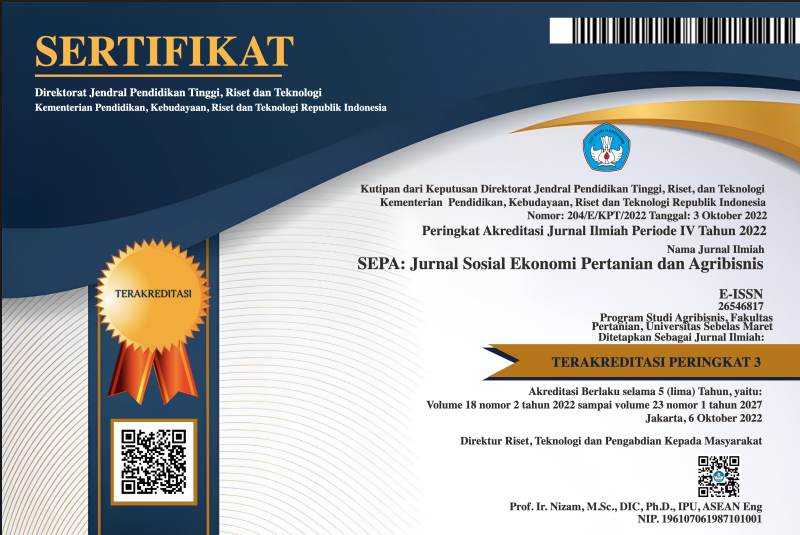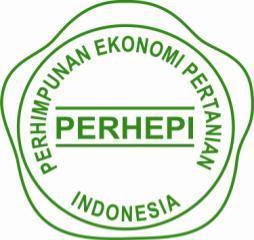RESILIENCE MODEL FOR THE EMPOWERMENT OF YOUNG COFFEE AGRIPRENEURS IN NAVIGATING BUSINESS ENVIRONMENT UNCERTAINTIES
Abstract
Keywords
Full Text:
PDFReferences
Atanassova, I., & Bednar, P. (2022). Managing Uncertainty: Company’s Adaptive Capabilities during Covid-19. Complex Systems Informatics and Modeling Quarterly, 2022(33), 14–39. https://doi.org/10.7250/csimq.2022-33.02
Ayamga, M., Annosi, M. C., Kassahun, A., Dolfsma, W., & Tekinerdogan, B. (2024). Adaptive organizational responses to varied types of failures: Empirical insights from technology providers in Ghana. Technovation, 129(August 2023), 102887. https://doi.org/10.1016/j.technovation.2023.102887
Bashiru, M., Ouedraogo, M., Ouedraogo, A., & Läderach, P. (2024). Smart farming technologies for sustainable agriculture: a review of the promotion and adoption strategies by smallholders in Sub-Saharan Africa. Sustainability (Switzerland) , 16(11). https://doi.org/10.3390/su16114817
Bouloiz, H. (2020). Sustainable performance management using resilience engineering. International Journal of Engineering Business Management, 12, 1–12. https://doi.org/10.1177/1847979020976205
Budiman, I., Wagemakers, A., Derks, M., Sahara, & Moore, S. (2024). Socio-environmental systems in technology adoption in animal husbandry in South-East Asia: A framework synthesis approach. NJAS: Impact in Agricultural and Life Sciences, 96(1). https://doi.org/10.1080/27685241.2024.2349518
de Boon, A., Sandström, C., & Rose, D. C. (2024). To adapt or not to adapt, that is the question. Examining farmers’ perceived adaptive capacity and willingness to adapt to sustainability transitions. Journal of Rural Studies, 105(December 2023). https://doi.org/10.1016/j.jrurstud.2023.103171
Dipierri, A. A., & Zikos, D. (2020). The role of common-pool resources’ institutional robustness in a collective action dilemma under environmental variations. Sustainability (Switzerland), 12(24), 1–21. https://doi.org/10.3390/su122410526
Djaakum, C. S. (2019). Peer to peer lending against ease of business Technology Acceptance Model (TAM) Approach. Economica: Jurnal Ekonomi Islam, 10(2), 217–238. https://doi.org/10.21580/economica.2019.10.2.3476
Dombroski, K., Diprose, G., Sharp, E., Graham, R., Lee, L., Scobie, M., Richardson, S., Watkins, A., & Martin-Neuninger, R. (2020). Food for people in place: reimagining resilient food systems for economic recovery. Sustainability (Switzerland), 12(22), 1–17. https://doi.org/10.3390/su12229369
Elia, G., Margherita, A., Ciavolino, E., & Moustaghfir, K. (2021). Digital society incubator: Combining exponential technology and human potential to build resilient entrepreneurial ecosystems. Administrative Sciences, 11(3). https://doi.org/10.3390/ADMSCI11030096
Faisal, S. I., & Abd Rashid, I. M. (2023). Technological adoption, financial well-being, financial literacy and international entrepreneur intention in Malaysia. International Journal of Academic Research in Business and Social Sciences, 13(1), 1248–1254. https://doi.org/10.6007/ijarbss/v13-i1/15447
Ghozali, I., & Latan, H. (2016). Partial least square “konsep, teknik dan aplikasi” menggunakan program smartPLS 3.0. Badan Penerbit Universitas Diponegoro.
Gibson, P. A. (2023). Shortening the supply chain through smart manufacturing and green technology. Sustainability (Switzerland), 15(22). https://doi.org/10.3390/su152215735
Gligor, D., Gligor, N., Holcomb, M., & Bozkurt, S. (2019). Distinguishing between the concepts of supply chain agility and resilience: A multidisciplinary literature review. The International Journal of Logistics Management, 2(30), 467–487.
Guo, X., Li, J., Lin, Z., & Ma, L. (2024). The impact of environmental regulation and technical cognition on farmers’ adoption of safety agro-utilization of heavy metal-contaminated farmland soil. Sustainability (Switzerland) , 16(8). https://doi.org/10.3390/su16083343
Hamid, W. (2017). Growth, challenges and issues related to Micro, Small and MediumEnterprises (MSMEs) in Jammu and Kashmir. Business and Economics Journal, 08(04), 4–9. https://doi.org/10.4172/2151-6219.1000328
Haque, C. E., Khan, S. A., & Choudhury, M. (2024). Role of multi-level institutions in facilitating innovation and adaptation technologies for reducing climate risk and impact: Evidence from coastal communities of Bangladesh. International Journal of Disaster Risk Reduction, 111(July), 104669. https://doi.org/10.1016/j.ijdrr.2024.104669
Hassan, R., Suhaili, W. S., Nore, B. F., & Basunia, M. A. (2023). Youth resilience toward climate smart agriculture technology adoption in Brunei Darussalam. ASEAN Journal on Science and Technology for Development , 40(3), 195–202. https://doi.org/10.61931/2224-9028.1545
Hokmabadi, H., Rezvani, S. M. H. S., & de Matos, C. A. (2024). Business resilience for small and medium enterprises and startups by digital transformation and the role of marketing capabilities—a systematic review. Systems, 12(6). https://doi.org/10.3390/systems12060220
Hong, X., Chen, Y. J., Gong, Y., & Wang, H. (2024). Farmers’ green technology adoption: Implications from government subsidies and information sharing. Naval Research Logistics, 71(2), 286–317. https://doi.org/10.1002/nav.22150
Jain, V., Kumar, S., Soni, U., & Chandra, C. (2017). Supply chain resilience: model development and empirical analysis. International Journal of Production Research, 55(22), 6779–6800.
Jawo, T. O., Teutscherová, N., Negash, M., Sahle, K., & Teutscherová, N. (2023). Smallholder coffee-based farmers ’ perception and their adaptation strategies of climate change and variability in South-Eastern Ethiopia. International Journal of Sustainable Development & World Ecology, 30(5), 533–547. https://doi.org/10.1080/13504509.2023.2167241
Kakkavou, K., Gemtou, M., & Fountas, S. (2024). Drivers and barriers to the adoption of precision irrigation technologies in olive and cotton farming—Lessons from Messenia and Thessaly regions in Greece. Smart Agricultural Technology, 7(December 2023), 100401. https://doi.org/10.1016/j.atech.2024.100401
Kangogo, D., Dentoni, D., & Bijman, J. (2020). Determinants of farm resilience to climate change: The role of farmer entrepreneurship and value chain collaborations. Sustainability (Switzerland), 12(3). https://doi.org/10.3390/su12030868
Kangogo, D., Dentoni, D., & Bijman, J. (2021). Adoption of climate‐smart agriculture among smallholder farmers: Does farmer entrepreneurship matter? Land Use Policy, 109(July), 105666. https://doi.org/10.1016/j.landusepol.2021.105666
Karbo, R. T. viel, Frewer, L. J., Areal, F., Jones, G., & Nurudeen, S. (2024). A systematic review of the efficacy of theories used to understand farmers’ technology adoption behavior in lower-to-middle-income countries. Development Studies Research, 11(1). https://doi.org/10.1080/21665095.2023.2294696
Khan, O., Daddi, T., & Iraldo, F. (2021). Sensing, seizing, and reconfiguring: Key capabilities and organizational routines for circular economy implementation. Journal of Cleaner Production, 287, 125565. https://doi.org/10.1016/j.jclepro.2020.125565
Kholidi Hadi, H. (2022). Pengaruh dinamisme lingkungandan ketidakpastian lingkungan terhadap kinerja UMKM. Jurnal Ilmu Manajemen, 10, 902–910.
Khurana, I., Dutta, D. K., & Ghura, A. S. (2022). SMEs and digital transformation during a crisis: The emergence of resilience as a second-order dynamic capability in an entrepreneurial ecosystem. Journal of Business Research, 150, 623–641. https://doi.org/10.1016/j.jbusres.2022.06.048
Kulig, J. C., Edge, D. S., Joyce, B., & Deer, R. (2008). Understanding community resiliency in rural communities through multimethod research. Journal of Rural and Community Development, 3(3), 77–94.
Li, Y., Xu, J., Liu, F., & Zhang, X. (2024). Impact and mechanism of digital information selection on farmers’ ecological production technology adoption: a study on wheat farmers in China. Agriculture (Switzerland), 14(5). https://doi.org/10.3390/agriculture14050713
Magableh, K. N. Y., Kannan, S., & Hmoud, A. Y. R. (2024). Innovation business model: adoption of blockchain technology and big data analytics. Sustainability (Switzerland), 16(14), 1–25. https://doi.org/10.3390/su16145921
Malherbe, W., Biggs, R., & Sitas, N. (2024). Comparing apples and pears: Linking capitals and capacities to assess the resilience of commercial farming operations. Agricultural Systems, 217(March), 103934. https://doi.org/10.1016/j.agsy.2024.103934
Manning, L. (2024). Innovating in an uncertain world: understanding the social, technical and systemic barriers to farmers adopting new technologies. Challenges, 15(2), 32. https://doi.org/10.3390/challe15020032
Megerssa, G. R., Garedew, W., Bekele, A. E., Grabs, J., & Jespersen, K. (2025). How do institutions shape the resilience of the Ethiopian coffee sector amidst the pressures of climate change? Sustainable Development, 1–23. https://doi.org/10.1002/sd.70065
Meyana, Y. E., Sunarni, E. A., & Lestari, R. A. (2023). Green dynamic capability dalam rangka mencapai UMKM sustainable beautifashion di Kota Malang. Seminar Nasional Sistem, September, 3953–3964.
Mukherjee, S. (2018). Challenges to Indian micro small scale and medium enterprises in the era of globalization. Journal of Global Entrepreneurship Research, 8(1). https://doi.org/10.1186/s40497-018-0115-5
Peñarroya-Farell, M., & Miralles, F. (2022). Business model adaptation to the covid-19 crisis: strategic response of the Spanish Cultural and creative Firms. Journal of Open Innovation: Technology, Market, and Complexity, 8(1), 39. https://doi.org/10.3390/joitmc8010039
Pettit, T. ., Fiksel, J., & Croxton, K. . (2010). Ensuring supply chain resilience: development of a conceptual framework. Journal of Business Logistics, 31, 1–21.
Prakash, B., Kumar, I., & Verma, J. K. (2021). Barriers and potential solutions for MSMEs in developing economies: Evidence from India. Problems and Perspectives in Management, 19(4), 325–337. https://doi.org/10.21511/ppm.19(4).2021.26
Putritamara, J. A., Hartono, B., Toiba, H., & Utami, H. N. (2023). Do dynamic capabilities and digital transformation improve business resilience during the covid-19 pandemic ? Insights from Beekeeping MSMEs in Indonesia.
Rai, S. S., Rai, S., & Singh, N. K. (2021). Organizational resilience and social-economic sustainability: COVID-19 perspective. Environment, Development and Sustainability, 23(8), 12006–12023. https://doi.org/10.1007/s10668-020-01154-6
Rodriguez-camayo, F., Ramirez-villegas, J., Borgemeister, C., Lundy, M., Giraldo, N., & Beuchelt, T. (2025). Climate risk management understanding coffee farmers ’ poverty , food insecurity and adaptive responses to climate stress. Evidence from western Honduras. Climate Risk Management, 49(August), 100735. https://doi.org/10.1016/j.crm.2025.100735
Ruiz-garcía, P., & Monterroso-rivas, A. I. (2025). Nature-based solutions contribute to improve the adaptive capacity of coffee farmers : evidence from Mexico. Agriculture, 15, 1–22.
Rwigema, P. . (2020). Effect of covid-19 on micro, small and medium enterprises (MSMES) in Rwanda. Strategic Journal of Business & Change Management, 7(4). https://doi.org/10.61426/sjbcm.v7i4.1886
Sartono, Y., Astuti, E. S., Wilopo, W., & Noerman, T. (2024). Enhancing sustainability in solution projects through social CRM: an expansion of the self-efficacy value adoption model. Sustainability (Switzerland), 16(19). https://doi.org/10.3390/su16198353
Singh, C. S., Soni, G., & Badhotiya, G. K. (2019). Performance indicators for supply chain resilience: review and conceptual framework. Journal of Industrial Engineering International, 15(s1), 105–117. https://doi.org/10.1007/s40092-019-00322-2
Steenwerth, K. L., Reynolds, M. P., Sandoval Solis, S., Sischo, W. M., Lubell, M. N., Msangi, S., Prabhu, R., Springborn, M., Wollenberg, E. K., Jarvis, L. S., Jackson, L. E., Tittonell, P., Wheeler, S. M., Vermeulen, S. J., Cattaneo, A., Chartres, C. J., Hatfield, J. L., Hodson, A. K., Bloom, A. J., … Jenkins, B. M. (2014). Climate-smart agriculture global research agenda: scientific basis for action [electronic resource]. Agriculture and Food Security, 3(1), 56.
Sunardi, R., Hamidah, H., Buchdadi, A. ., & Purwana, D. (2022). Factors determining adoption of fintech peer-to-peer lending platform: an empirical study in Indonesia. The Journal of Asian Finance, Economics and Business, 9(1), 43–51. https://doi.org/10.13106/jafeb.2022.vol9.no1.0043
Sundstrom, S. M., Angeler, D. G., & Allen, C. R. (2023). Resilience theory and coerced resilience in agriculture. Agricultural Systems, 206. https://doi.org/10.1016/j.agsy.2023.103612
Suryawati, S., Budi Helpiastuti, S., Firdaus, A., & Suji, S. (2023). Model pendekatan adaptif sebagai upaya membangkitkan resiliensi UMKM. Jurnal Ilmu Sosial Dan Humaniora, 12(1), 60–72. https://doi.org/10.23887/jish.v12i1.51741
Trieu, H. D. X., Nguyen, P. Van, Nguyen, T. T. M., Vu, H. T. M., & Tran, K. T. (2023). Information technology capabilities and organizational ambidexterity facilitating organizational resilience and firm performance of SMEs. Asia Pacific Management Review, 28(4), 544–555. https://doi.org/10.1016/j.apmrv.2023.03.004
Ullah, R., Shivakoti, G. P., Zulfiqar, F., & Kamran, M. A. (2016). Farm risks and uncertainties: Sources, impacts and management. Outlook on Agriculture, 45(3), 199–205. https://doi.org/10.1177/0030727016665440
Yanore, L., Sok, J., & Oude Lansink, A. (2024). Do Dutch farmers invest in expansion despite increased policy uncertainty? A participatory Bayesian network approach. Agribusiness, 40(1), 93–115. https://doi.org/10.1002/agr.21834
Zhang, L., Gao, W., Ma, X., & Gong, R. (2023). Relationship between disaster shock experience and farmers’ entrepreneurial inclination: crisis or opportunity? Agriculture (Switzerland), 13(7). https://doi.org/10.3390/agriculture13071406
Zhang, T., Lang, L., Zhao, N., Lu, Q., & Sun, B. (2024). Perceived organizational support, inter-temporal choice, and farmer conservation tillage adoption. Agriculture (Switzerland), 14(5), 1–29. https://doi.org/10.3390/agriculture14050667
DOI: https://doi.org/10.20961/sepa.v22i2.95639



.png)







.png)
3.png)





